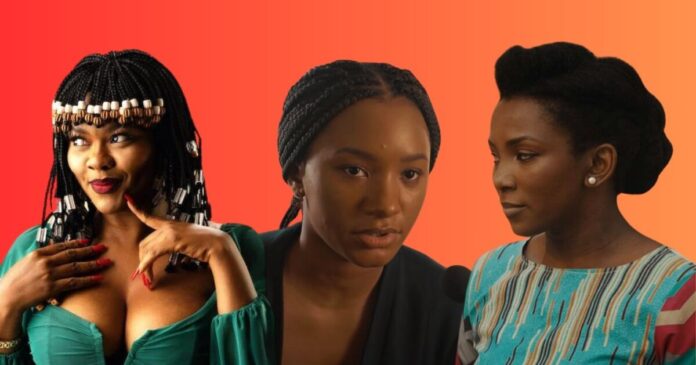By Aaior K. Comfort
In her seminal work, Black Looks: Race and Representation (1992), cultural theorist Bell Hooks introduced the concept of the “oppositional gaze,” a framework that empowers Black women to challenge the dominant narratives imposed by patriarchal and white-centric media. This perspective is crucial for examining the portrayal of African women in Nollywood, Nigeria’s thriving film industry, which has made significant strides in African storytelling but continues to grapple with entrenched patriarchal norms.
Historically, Nollywood narratives have been male-dominated, often relegating women to secondary roles defined by stereotypical gender norms. Female characters are frequently depicted as dutiful wives, obedient daughters, or weary mothers, reinforcing the notion that a woman’s value is tied to her caregiving abilities. Alternatively, women are portrayed as either objects of desire or sinister figures, perpetuating the dichotomy of virtuous versus dangerous seductresses. Such limited representations deny women the opportunity to be seen as multifaceted individuals with their own dreams, flaws, and aspirations.
However, recent films like Blood Sisters (2022) signal a transformative shift in female representation, reminiscent of how Thelma and Louise (1991) redefined women’s roles in American cinema. Despite this progress, there remains a significant risk that Nollywood could continue to reinforce harmful stereotypes, thereby limiting women’s roles both on and off the screen.
The oppositional gaze serves as a powerful tool for resisting these traditional portrayals. By actively recognizing the constraints placed on women in Nollywood, female filmmakers, actors, and viewers can begin to challenge and subvert these narratives. For example, Lionheart (2018), directed by Genevieve Nnaji, features a strong female lead who navigates the complexities of managing her family’s business in a male-dominated environment. Similarly, Kemi Adetiba’s King of Boys (2018) showcases the character Eniola Salami, a morally complex figure who defies the one-dimensional stereotypes that have historically defined women in the industry.
These films exemplify a growing movement within Nollywood where women are reclaiming their stories and pushing back against patriarchal constraints. By adopting the oppositional gaze, female filmmakers are able to create more nuanced portrayals of women, challenging the limited roles that have long characterized their representation.
As Hooks argues, Black women can actively critique and resist dominant portrayals through the oppositional gaze, rejecting the narratives imposed by patriarchal media. In Nollywood, female viewers can similarly demand more layered and diverse depictions of women, particularly in a culture where films significantly shape societal perceptions of gender. Supporting films that offer inclusive and empowering narratives for women can drive the industry toward necessary evolution.
While improvements in female representation within Nollywood are evident, there remains much work to be done. The oppositional gaze is a vital instrument in the ongoing challenge against the patriarchal narratives that persist in the industry. As Nollywood continues to gain international recognition, its portrayal of African women will have a far-reaching impact, countering Western misrepresentations often seen in media like the Luxembourgian series Capitani. Nollywood possesses the unique ability to tell stories with authenticity, complexity, and dignity.
In conclusion, the oppositional gaze empowers women in Nollywood, both in front of and behind the camera, to challenge, resist, and redefine their portrayals. As the industry evolves, this perspective will be essential in ensuring that women’s stories are told, their voices are heard, and their representations reflect the diversity and complexity of their lived experiences.

